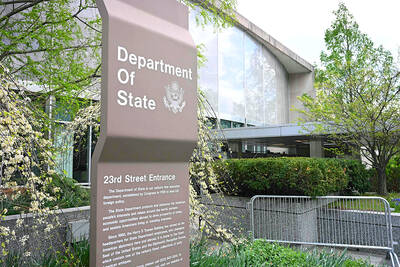Democratic Progressive Party (DPP) Chairman Su Tseng-chang (蘇貞昌) reiterated yesterday that human rights protection and implementation should play a crucial role in the cross-strait talks on an investment protection agreement.
“The government should make sure that the pact is not another empty agreement,” Su said after the party’s weekly Central Standing Committee meeting.
The majority of the 16 agreements signed in the past four years were not implemented, which makes Beijing’s determination to enforce the clauses on personal safety questionable, Su said.
The DPP first proposed signing a cross-strait investment protection agreement in 1992, because personal safety and basic human rights of Taiwanese in China were not protected, Su said.
“We still insist today that personal safety, including detention notifications within 24 hours, visiting rights for families, rights to hire lawyers and to have a lawyer present during questioning should be prioritized,” he said.
The government should also prioritize the institutionalization of Chinese investment in Taiwan, Su said, because Beijing has been strategically deploying its sovereignty wealth funds and investments from state-run companies worldwide.
“These investments entail a risk to national security for Taiwan if Chinese invest in sensitive industries,” he said.
The DPP has listed regulations institutionalizing Chinese investment inflows as a priority item on the legislative agenda in the next session, Su said.
The party’s Central Standing Committee yesterday also reached a resolution on the case of Bruce Chung (鍾鼎邦), a Taiwanese businessman and Falun Gong practitioner who has been detained in China since June 18, demanding that the government raise the issue with Chinese officials in today’s negotiations and pledging to support rescue efforts.
Separately yesterday, former DPP chairperson Tsai Ing-wen (蔡英文) urged President Ma Ying-jeou (馬英九) to speak out about Chung’s detention and Beijing’s behind-the-scenes maneuvering to remove Republic of China flags from an Olympics promotional event in London.
“A government that only appeases China or asks for favors from China will never win Beijing’s respect nor reassure Taiwanese,” she said in a press release.
Tsai, who is known as a tough negotiator and an international trade expert, questioned the substance of the proposed cross-strait investment protection and promotion agreement.
Tsai said Ma needs to explain why Taiwan and China could not solve trade disputes in an international arbitration mechanism despite the fact that both are WTO members.
The government should explain how person-to-person disputes would be arbitrated in a third country before China amends its domestic law and how person-to-government dispute settlement would be implemented and legally binding without an international arbitration mechanism, she said.
Tsai also questioned why a clause demanding that China notify Taiwan’s government and the families of Taiwanese who have been detained could not be written into the agreement and why the clause could not cover all Taiwanese people.
The Straits Exchange Foundation (SEF) has failed to play a neutral role in the eight rounds of negotiations thus far, she said, adding that SEF Chairman Chiang Pin-kung (江丙坤) had a conflict of interests and was overly influenced by his role as deputy chairman of the Chinese Nationalist Party (KMT).
No institution and mechanism in Taiwan has the authority to monitor the semi-governmental SEF, which is alleged to be involved in cross-strait lobbying and profiteering, and that is why it needs a complete reform, Tsai said.

Hong Kong singer Eason Chan’s (陳奕迅) concerts in Kaohsiung this weekend have been postponed after he was diagnosed with Covid-19 this morning, the organizer said today. Chan’s “FEAR and DREAMS” concert which was scheduled to be held in the coming three days at the Kaohsiung Arena would be rescheduled to May 29, 30 and 31, while the three shows scheduled over the next weekend, from May 23 to 25, would be held as usual, Universal Music said in a statement. Ticket holders can apply for a full refund or attend the postponed concerts with the same seating, the organizer said. Refund arrangements would

Former president Tsai Ing-wen (蔡英文) on Monday called for greater cooperation between Taiwan, Lithuania and the EU to counter threats to information security, including attacks on undersea cables and other critical infrastructure. In a speech at Vilnius University in the Lithuanian capital, Tsai highlighted recent incidents in which vital undersea cables — essential for cross-border data transmission — were severed in the Taiwan Strait and the Baltic Sea over the past year. Taiwanese authorities suspect Chinese sabotage in the incidents near Taiwan’s waters, while EU leaders have said Russia is the likely culprit behind similar breaches in the Baltic. “Taiwan and our European

Taiwanese indie band Sunset Rollercoaster and South Korean outfit Hyukoh collectively received the most nominations at this year’s Golden Melody Awards, earning a total of seven nods from the jury on Wednesday. The bands collaborated on their 2024 album AAA, which received nominations for best band, best album producer, best album design and best vocal album recording. “Young Man,” a single from the album, earned nominations for song of the year and best music video, while another track, “Antenna,” also received a best music video nomination. Late Hong Kong-American singer Khalil Fong (方大同) was named the jury award winner for his 2024 album

The US Department of State on Monday reaffirmed that US policy on Taiwan remains unchanged, following US President Donald Trump’s use of the term “unification” while commenting on recent trade talks with China. Speaking at a wide-ranging press conference, Trump described what he viewed as progress in trade negotiations with China held in Geneva, Switzerland, over the weekend. “They’ve agreed to open China — fully open China, and I think it’s going to be fantastic for China. I think it’s going to be fantastic for us,” Trump said. “I think it’s going to be great for unification and peace.” Trump’s use of the